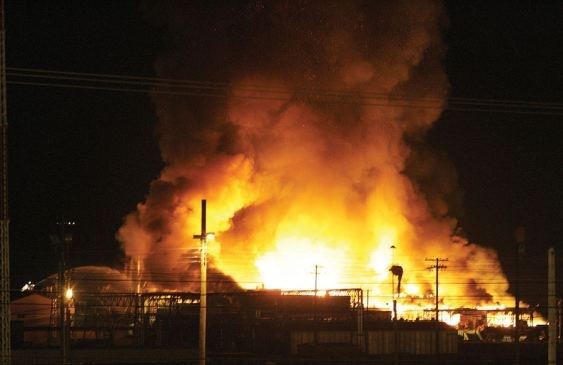A former WorkSafeBC CEO gave his account of events surrounding the agency's decision to take its findings for two northern B.C. sawmill explosions to Crown counsel when he took the stand Wednesday at the coroner's inquest into the Lakeland Mills blast.
The explosion at the Prince George sawmill occurred on April 23, 2012, three months after a similar incident on Jan. 20, 2012 struck Babine Forest Products near Burns Lake.
In all, four workers were killed and more than 40 more injured in the two disasters, prompting two of the largest investigations ever carried out by WorkSafeBC.
Once the findings were in, Dave Anderson, who retired from the agency midway through 2014, told the inquest that WorkSafeBC could have treated the incidents strictly as matters of administrative sanction but legislation also allowed the possibility of taking the matters to court.
After reviewing investigators' reports and consulting with a WorkSafeBC lawyer, Anderson said it was his decision to forward the findings to Crown counsel because he felt a trial would provide the appropriate public forums given the magnitude of the events.
"I felt that this case was so tragic and so potentially still dangerous to other workers and (there was) such a high level of anxiety in the province amongst the worker community and the employer community, (that) I felt that the public airing of the facts in a court case, in a jury trial, would be preferential to the rather quiet administrative sanctions which tends to take place between the company and Workers Compensation Board," Anderson said.
Glenn Roche, 46 and Alan Little, 43, died from injuries at Lakeland and Robert Luggi Jr., 45, and Carl Charlie, 42 were killed in the Babine explosion.
WorkSafeBC recommended four charges under provincial safety law, but no criminal-negligence charges. If evidence was uncovered suggesting criminal wrongdoing, Anderson said the investigation would have been turned over to RCMP.
Following the Lakeland incident, it took RCMP two-and-a-half days to decide no criminal offence was committed following the Lakeland Mills explosion.
RCMP investigators relied on statements taken from 13 mill employees who had been in the sawmill when the blast occurred, as well as from a WorkSafeBC inspector and a Prince George Fire Rescue fire prevention officer to reach the conclusion.
The 13 employees were given a questionnaire similar to one RCMP used following the Babine explosion.
Crown counsel eventually decided against pursuing charges, in part because no warrants were issued rendering some evidence inadmissible in court, although it was also noted the mill owners would likely have had a good argument for due diligence.
Anderson said WorkSafeBC could have appealed the decision but decided not to. He said Crown concluded a jury would likely find the employers could not have reasonably foreseen such catastrophic events and had taken steps showing they were sufficiently careful.
"I looked at those things and said, in my own layman's mind that kind of demonstrates they knew what could be done, they just didn't do enough and they did it too infrequently," Anderson said. "But that said, I conferred to Crown because I respected their legal expertise."
WorkSafeBC did issue steep fines against the owners of the sawmills. Lakeland Mills Ltd. was fined $724,163, consisting of a $97,500 administrative penalty and a $626,663 claims cost levy.
The total remains less than the $1.01-million penalty issued against the owners of Babine Forest Products, the highest ever issued by WorkSafeBC. It consists of a $97,500 administrative penalty and a $914,000 claims cost levy.
Both penalties are being appealed by the sawmills' respective owners.
The inquest jury will begin deliberations today on the cause of death and develop recommendations to prevent a similar tragedy in the future.
Over four weeks, the inquest has heard from 55 witnesses.



